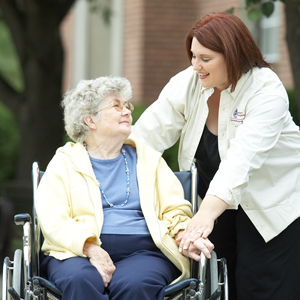Coping with a Loved One with Hearing Loss
Blog | August 17, 2016
Presbycusis is a gradual loss of hearing that may come with age. It can be caused by changes in the inner ear, auditory nerve, middle ear, or outer ear. It can also be caused by loud noise exposure, heredity, head injury, infection, illness, some prescription drugs, and circulation problems, including high blood pressure.
Tinnitus, which is also common in seniors, causes a ringing, hissing, or roaring sound in the ears. It can be the result of exposure to loud noise or certain medicines, and can accompany any type of hearing loss.
If a senior has not been diagnosed with hearing loss, but it is obvious that it is present, referral to a specialist may be necessary. Start with a visit to his or her regular doctor. The doctor may then refer the senior to an otolaryngologist, a physician who specializes in ear, nose, and throat – or an audiologist, who is a health professional who conducts tests to define hearing loss. Sometimes the two work together in an office.
A senior with hearing loss may struggle with hearing alarms or telephones, or understanding speech on
TV or radio; may be unaware that someone is talking or whispering; and may have a lack of understanding when talking on the phone, if several people are in a large room or many people are talking, or
when a speaker’s face can’t be seen.
Psychological and Social Implications
Seniors with hearing loss may suffer negative psychological and emotional effects that can affect them socially. Here are some examples of what they may experience:
- Feelings of being ashamed, inadequate, stupid, awkward, embarrassed, humiliated, or abnormal.
- Difficulty thinking or concentrating, which can result in inattentiveness, distraction, and boredom.
- Worry about loss of significant relationships, jobs, or about being perceived as incompetent.
- A feeling of worthlessness, which could cause withdrawal from others and a lack of participation
in everyday living.
How to Support a Senior with Hearing Loss
Stay sympathetic. While it is very frustrating to deal with seniors with hearing loss, it is even more frustrating for them. Don’t ever respond “Never mind, it’s not important.” It only makes the person feel that he or she is not important enough to include.
Be patient. People who suffer from hearing loss wait 5-7 years before they do anything. Your loving support may speed up that process a bit, but if at any point you feel frustrated, remind yourself
that this is a difficult and lengthy process.
Show understanding. Studies have linked hearing loss in seniors to feelings of stress, tension, depression, social isolation, irritability, negativity and anger. Don’t let their attitude get you down.
Try to understand the difficult situation they must live with every day.
Be respectful. Speak openly and naturally, and do not speak on the senior’s behalf. Ask questions clearly or rephrase conversation so he or she may speak for himself or herself.
Don’t be too helpful: Do not act as “ears” for the senior. While you think that you’re helping out a
loved one, it builds a relationship of co-dependence that can hurt him or her over time.
When you speak:
- Minimize or eliminate background noise.
- Enunciate well, and don’t distort speech, mumble, or lower your voice at the end of a sentence.
- Use hands and facial expressions when you speak.
- Speak at a normal speed, not too quickly or too slowly.
- Speak more loudly – but never yell. Shouting distorts words.
- Rephrase your communication. Some seniors experience a type of hearing loss where certain
sounds are difficult to hear, such as the “shhh” sound.
A hearing aid may help. It won’t restore normal hearing, but it will increase awareness of sounds through magnification of sound vibrations. Larger vibrations are changed to signals sent to the brain,
but there are limits to amplification, and inner ear damage can mean that even large vibrations can’t
be translated into signals. A doctor or a specialist can determine if a hearing aid will be helpful.
Need in-home care? Call Comfort Keepers® today! Whether your loved one is suffering
from hearing loss or not, we can help. Comfort Keepers®’ Interactive Caregiving™ keeps senior clients engaged physically, mentally, and emotionally while living independently at home. Call your local Comfort Keepers office to see how we can help you.
Fast Fact
47% of Canadians over the age of 60 suffer from hearing loss, ranging from the inability to hear certain voices to deafness.
References:
Statistics Canada. “Hearing loss of Canadians, 2012 and 2013.” Web 2015.
Social Work Today. “Hearing Loss in Older Adults ─ Its Effect on Mental Health” by Claudia Dewane, DEd, LCSW. Web. 2016.
OptimalHearing.com. “Supporting Hearing Loss in the Elderly”. Web. 2016.
HearingLoss.org. Hearing Loss Association of America. “Living with Hearing Loss”. Web. 2016.
LiveScience.com. “How to Help Seniors with Hearing Loss”. Web. 2016.
Individualized Home Care Options
Long-Term Home Care, 24 Hour Home Care & Short Term Care Options Customized for You







